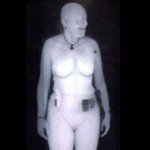Passengers reassured by federal officials that body scanners are safe
The Transportation Security Administration (TSA) said that even though the new full-body scanners installed at airports uses radiation powerful enough to see through passengers’ clothing, the radiation levels emitted by the controversial machines are minimal and will not cause cancer. The TSA has installed 385 scanners in 60 airports nationwide, and the agency said they plan to have 500 of the machines installed before the start of 2011.
Officials said that a single scan generates the amount of radiation roughly equal to what one can get inside a plane at 30,000 feet for three minutes, as the radiation level up there is higher. They said that in comparison, a dental x-ray delivers a much larger dose. The agency said that limits set for safe radiation exposure would not be reached until after 1,000 passes through the full-body scanners in a single year.
“We are confident that full-body X-ray security products and practices do not pose a significant risk to the public health,” a joint letter from the TSA and the Food and Drug Administration said to John Holdren, the science adviser of the White House.
But concerns about the safety of the machines persist among passengers, who are expected to increase in numbers as the holiday season approaches. Some pilots and even a few experts have also aired their apprehension about their use. Pilots and crew members are more frequently exposed to radiation and thus their risk of developing cancer is 1 percent greater than the public, the Health Physics Society says. Pilots can request screeners not to have them go through the scanners, but the aggressive pat-down that was made an alternative method also angered some pilots because private body parts are touched during checking.
